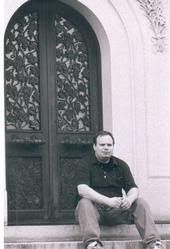The first British horror film of the sound era, 1933's THE GHOUL was no doubt inspired by the returns on Universal's early fright films, in particular 1932's THE MUMMY, which shares a similar theme. Long thought to be lost, this film from director T. Hayes Hunter was recently released on DVD in a gorgeous pristine print; fans of DRACULA and FRANKENSTEIN, etc. will undoubtedly want to check this one out (the film feels very much like an unearthed Universal feature), but even they will probably be disappointed when all is said and done.
Boris Karloff stars as a millionaire Egyptologist obsessed with the notion of an afterlife. The film begins with him on his deathbed, making the final arrangements of his immortality with his faithful manservant (Ernest Thesiger) and rejecting any Christian practices, lest his devotion to Anubis be compromised (this must've struck '30s audiences as incredible blasphemous; perhaps that's why Theisger pays a little lip service to the virtues of Christianity, espousing the "proper" views on religion--I doubt this scenario would've stood a chance with the Hays Code). Karloff insists on dying with the Eternal Light, a jewel stolen from an ancient Egyptian tomb that will grant everlasting life when offered to Anubis--which, conveniently enough, Karloff has a full-size statue of in his bedchamber--and will rise from the dead and take vengeance on anyone foolish enough to steal it. Fortunately for us viewers, everyone within a fifty-mile radius of him has an avaricious streak, so the jewel does turn up missing and Karloff arises as promised.
THE GHOUL does an excellent job of establishing mood with its use of shadow, and could carry a film on its atmosphere alone; too bad the story moves along too slowly, shifting into THE OLD DARK HOUSE mode as various characters move about, either searching for the jewel or trying to steal it back. Heavy on dialogue, these scenes do little to maintain--or generate, for that matter--any feeling of tension and wind up bogging down the film. There are a couple of points of interest that make up for such flaws, such as the ritual to Anubis in which Karloff carves ancient symbols into his chest as part of his offering (a somewhat shocking detail, given the time period) as well as Karloff himself, in a mute, expressive performance easily his best at that point, and maybe one of his best all around.
There is, however, the matter of the ending. I won't spoil it here, but I will say that if you're at all familiar in the SCOOBY-DOO tradition of plot resolution you won't be surprised. What bugged me most about the final moments of the film is that it contradicted all the supernatural elements of the story; I realize that the Ghoul of the title isn't Karloff but the one who stole the jewel, and it may have been added to offset some of the more sacrilegious elements of the story, but c'mon--if you're going to make a monster movie, let the damned monster be real.
Still, from a historical or film-scholar perspective, THE GHOUL remains a worthwhile entry.
Tuesday, February 12, 2008
Subscribe to:
Post Comments (Atom)

No comments:
Post a Comment